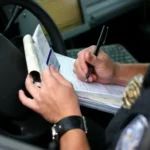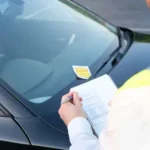Have you ever found yourself tapping your fingers impatiently on the steering wheel while stuck in traffic, only to witness someone zooming past you, blatantly ignoring traffic rules? We’ve all been there. In this article, we’re diving into the world of traffic violations – those seemingly small infractions that can have significant consequences. From speeding tickets to running red lights, join us as we unravel the various types of traffic violations, understand their implications, and maybe even pick up a few tips on how to stay on the right side of the road. Buckle up, and let’s explore the wild terrain of traffic rules and their violations!
What Are Traffic Violations?
Traffic violations refer to the breach of rules and regulations to ensure the safe and orderly traffic flow on roads. These infractions can range from minor offenses like parking in a no-parking zone to serious violations such as speeding, running red lights, or driving under the influence. Any action against the established traffic laws can be classified as a traffic violation. These infractions are not just about following rules for the sake of it; they are designed to prioritize the safety of everyone on the road. Understanding what constitutes a traffic violation and being mindful of these rules helps maintain order, prevent accidents, and contribute to a safer driving environment. So, whether it’s a simple traffic ticket or a more severe offense, knowing the rules of the road is key to staying on the right side of traffic law.
Common Traffic Violations
1. Speeding:
Speed limits are posted for a reason – to ensure the safety of all road users. Exceeding these limits not only endangers your safety but also threatens others. Speeding tickets can result in fines, points on your license, and increased insurance premiums. Some areas also implement speed cameras to enforce these limits.
2. Running Red Lights or Stop Signs:

Disregarding traffic signals is a blatant violation that can lead to serious accidents. Running red lights or failing to come to a complete stop at stop signs jeopardizes the safety of pedestrians and other drivers. Consequences often include fines, points on your license, and, in severe cases, traffic school or even license suspension.
3. Distracted Driving:
In the age of smartphones, distracted driving has become a major concern. Texting, talking on the phone, or engaging in other distracting activities diverts attention from the road. Many jurisdictions have implemented laws to penalize distracted driving, aiming to reduce the accidents caused by this hazardous behavior.
4. Driving Under the Influence (DUI):
Operating a vehicle while under the influence of alcohol or drugs is not only a traffic violation but a criminal offense. DUI offenses can lead to severe legal consequences, including license suspension, fines, mandatory substance abuse programs, and even imprisonment. The emphasis on preventing drunk driving is a crucial aspect of road safety campaigns.
5. Reckless Driving:
Reckless driving encompasses a range of aggressive and careless behaviors on the road, such as tailgating, weaving in and out of traffic, and disregarding the safety of others. Consequences for reckless driving often involve substantial fines, license points, and, in extreme cases, imprisonment. Some jurisdictions may also require offenders to attend defensive driving courses.
6. Illegal Parking:
Parking violations are common and can include parking in no-parking zones, blocking fire hydrants, or occupying spaces reserved for specific vehicles (such as handicapped spots). Illegally parked vehicles may be subject to fines, towing, or immobilization devices until the violation is rectified.
7. Expired or Missing License Plates:
License plates are a crucial component of vehicle identification. Driving with expired or missing license plates is not only a violation but can also impede law enforcement’s ability to identify a vehicle. Penalties typically include fines, and in some cases, vehicles may be impounded until the license plate issue is addressed.
8. Failure to Wear Seat Belts:
Wearing seat belts is a fundamental safety measure; failure to do so is often a traffic violation. Seat belt laws vary, but in many places, drivers and passengers are required to buckle up. Violating seat belt laws can result in fines, and in some jurisdictions, law enforcement may pull over drivers solely for seat belt checks.
Understanding and adhering to these traffic laws is essential for all drivers. Not only does it contribute to personal safety, but it also fosters a culture of responsible driving that benefits the entire community. Staying informed about local traffic regulations and consistently following them ensures a safer and more enjoyable experience on the road.
Consequences Of Traffic Violations

Regarding traffic violations, it’s not just breaking the rules and paying a fine. The repercussions extend far beyond that momentary lapse. First and foremost, there’s the financial toll. Fines, the immediate aftermath of a traffic violation, can vary depending on the severity of the offense. While a minor infraction might only pinch your wallet, more serious violations can result in hefty penalties that significantly impact your budget. However, the financial ramifications don’t end with fines. Your driving record becomes a key player in this narrative. Every violation adds points to your record, creating a visible trail of your infractions. This can lead to higher insurance premiums as insurers perceive you as a higher-risk driver. That impulsive decision to exceed the speed limit suddenly carries a long-term financial burden.
Speaking of insurance, the ripple effect continues. Beyond higher premiums, some violations may lead to the cancellation of your policy altogether, leaving you scrambling for coverage and facing the challenge of obtaining affordable insurance with a tainted driving history. But wait, there’s more on the legal side. Traffic violations often require court appearances, consuming both time and energy. From challenging a ticket to attending defensive driving courses, the legal proceedings can become a prolonged hassle, turning a simple traffic stop into an enduring bureaucratic journey.
It’s not just about the immediate consequences; it’s about the long-term impact on your personal and professional life. From financial strains to legal entanglements and even potential career setbacks, each decision on the road carries a weighty aftermath. So, the next time you contemplate pushing the limits, remember: it’s not just a red light; it’s a potential detour into a complex world of consequences. Drive wisely, and keep your journey on the smoothest course possible.
The Impact of Traffic Violations on Your Driving Record
The impact of traffic violations on your driving record is more than just a collection of points; it’s a dynamic force that can shape your motoring future. Each violation adds a stain to your driving history, and as these blemishes accumulate, the consequences become increasingly pronounced. At the forefront is the accumulation of points. Different violations carry different point values, and the more points you accrue, the more your driving record reflects a pattern of non-compliance. This, in turn, becomes a red flag for insurers who see you as a higher-risk driver. The result? Elevated insurance premiums can burden your budget for years to come.

Furthermore, certain severe violations can lead to suspending or revoking your driving privileges. It’s the ultimate consequence, leaving you reliant on alternative modes of transportation and navigating the bureaucratic maze to reinstate your license. The impact on employment should be considered. Jobs that involve driving often require a clean record, and a history dotted with traffic violations might impede career opportunities. Employers prioritize responsible and law-abiding drivers; your record is a testament to your adherence to these qualities. Additionally, depending on the severity, some violations stay on your record for an extended period, ranging from a few years to potentially a decade or more. This means that even after you’ve paid the fine or completed required courses, the shadow of past infractions continues to linger.
Conclusion
In essence, the impact of traffic violations on your driving record extends far beyond the immediate inconvenience of a ticket. It weaves into the fabric of your motoring identity, influencing insurance rates, employability, and even the basic freedom of hitting the road. So, as you navigate the streets, consider the immediate consequences and the lasting imprint each violation leaves on your driving record. Drive responsibly, and ensure your motoring legacy remains a testament to safe and law-abiding driving.
Oluwatukesi Joseph is a Content Writer at LOBF. He holds a Master’s Degree from Obafemi Awolowo University in Architecture, However, his love for writing and content creation has transitioned him into the writing and content marketing field. He has gained relevant certification from other notable Universities where he developed a strong foundation in content marketing and writing.
Outside of work, Joseph enjoys spending quality time with friends and family and playing chess, which he finds often complements his professional pursuits. Joseph is excited to be part of the dynamic team at The Law Office of Bryan Fagan, contributing his expertise to spreading the good news of LOBF to Families across Texas.




